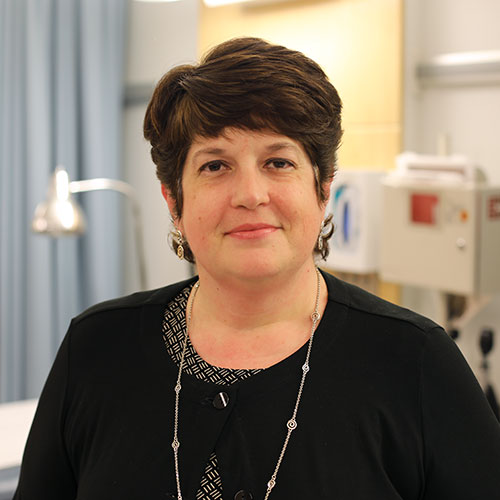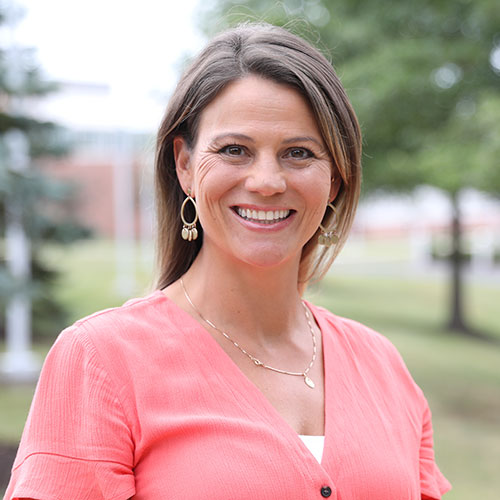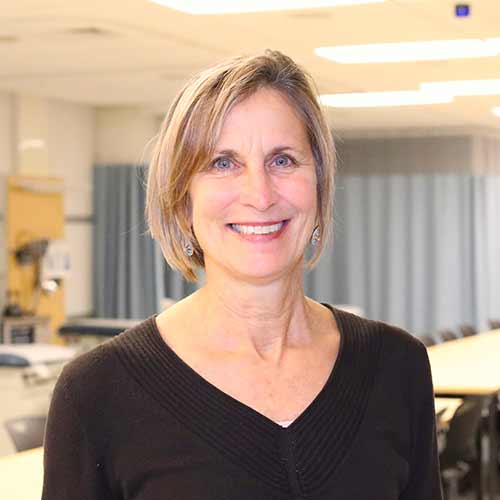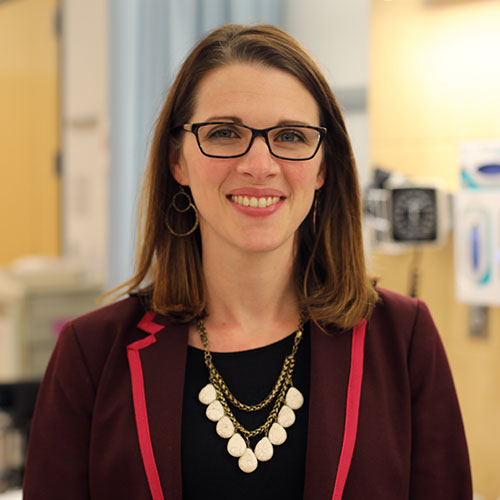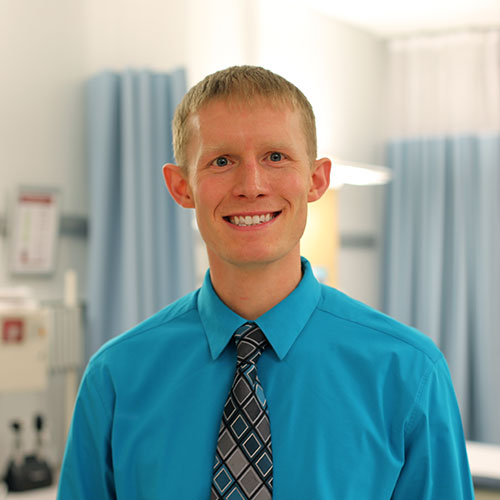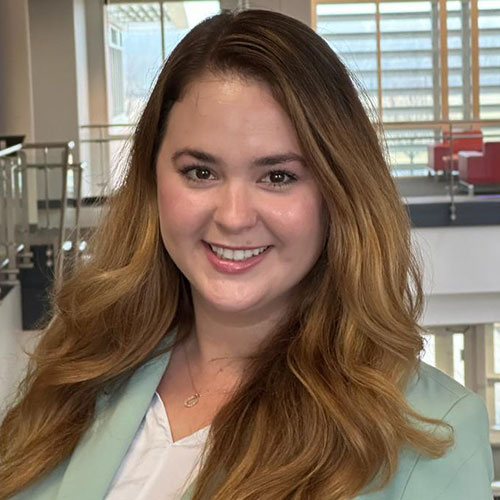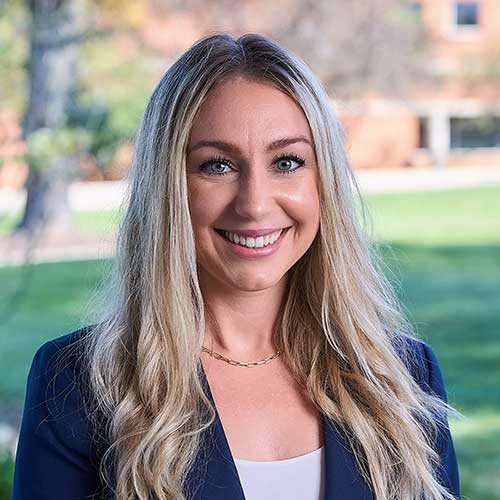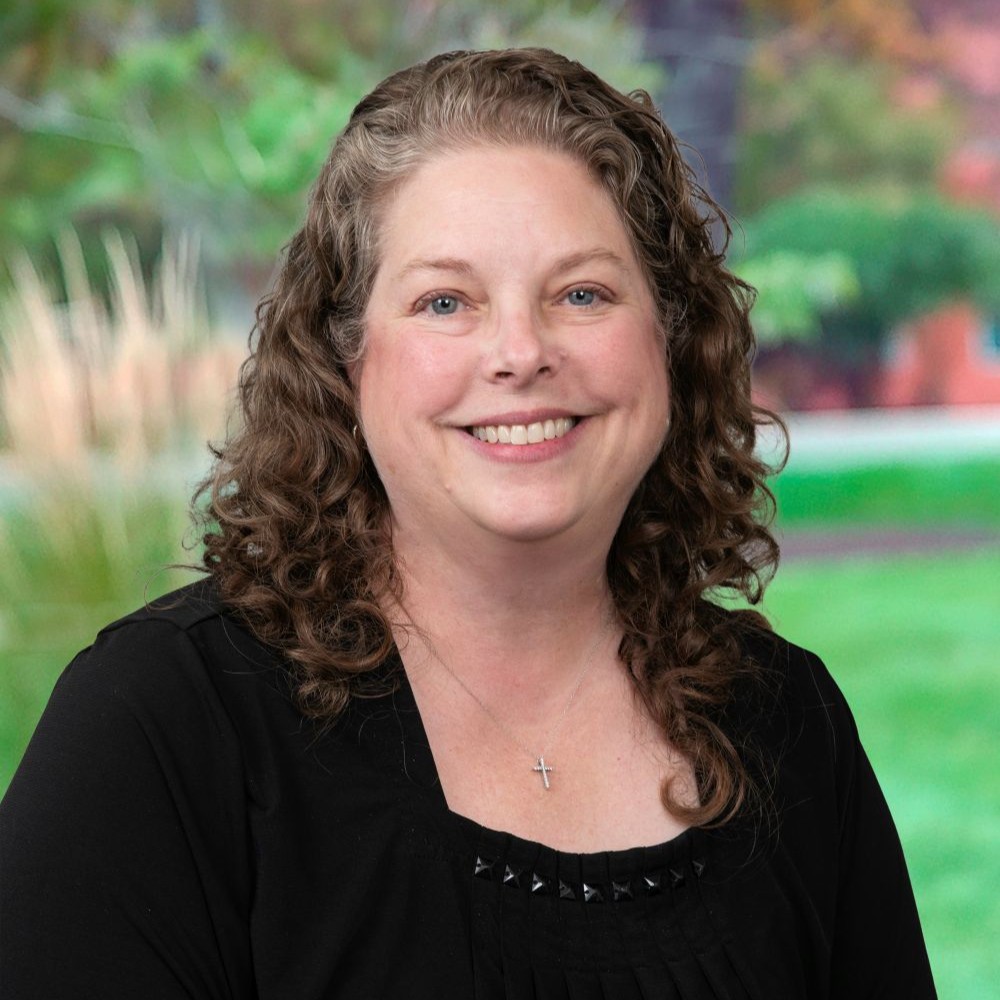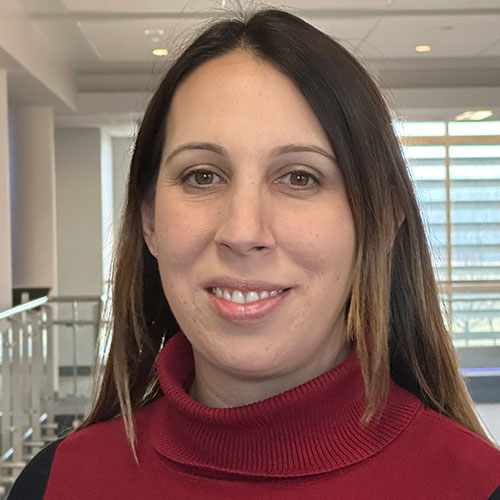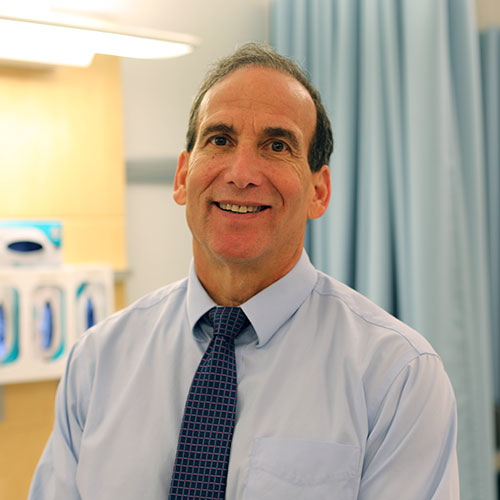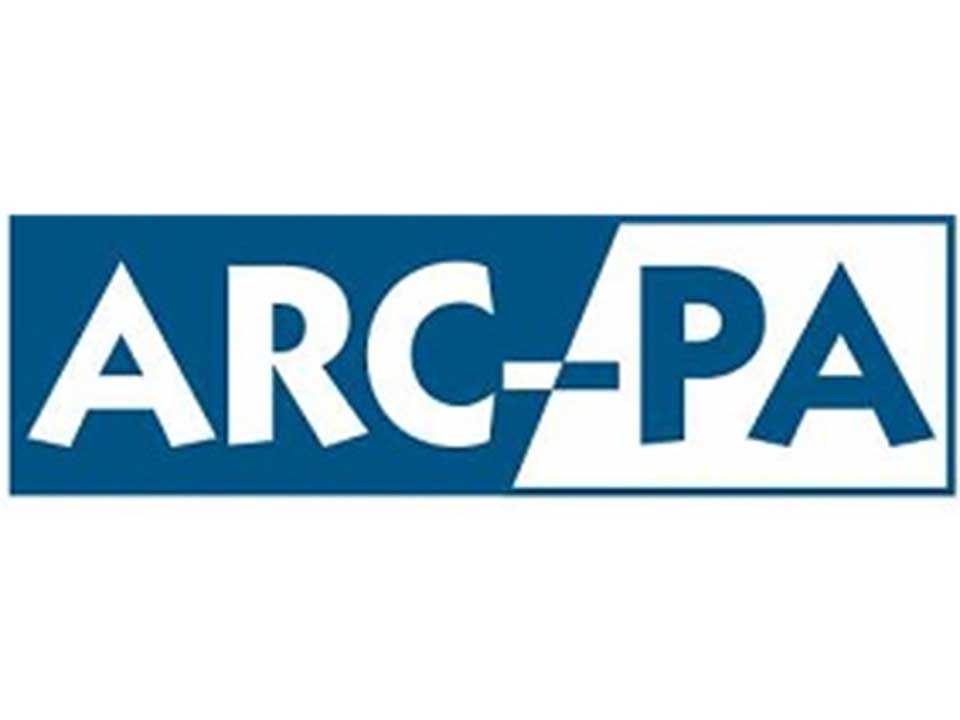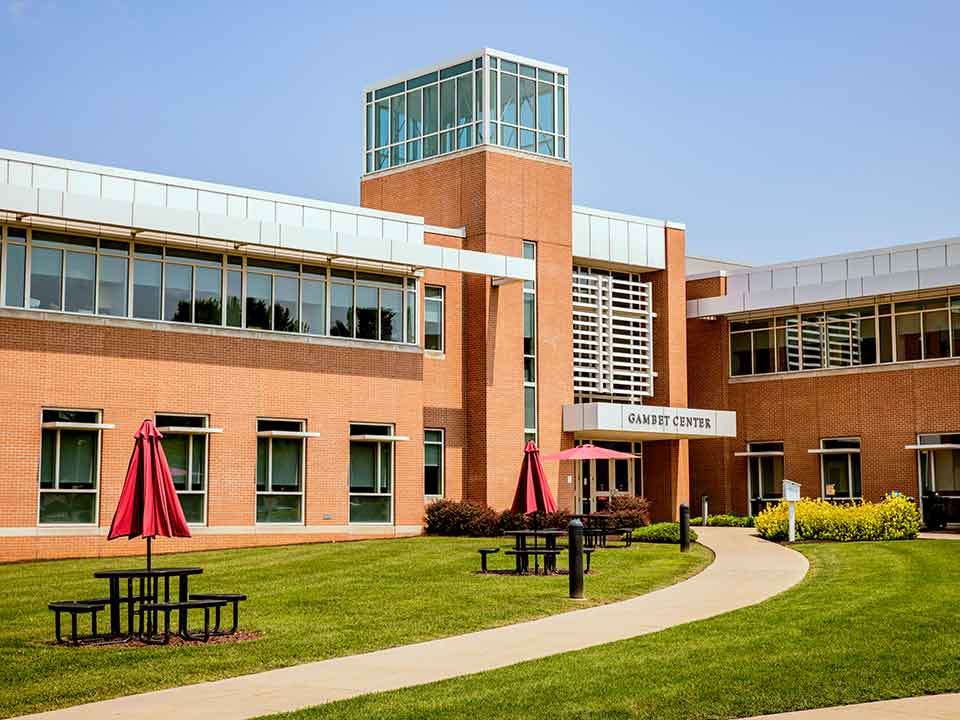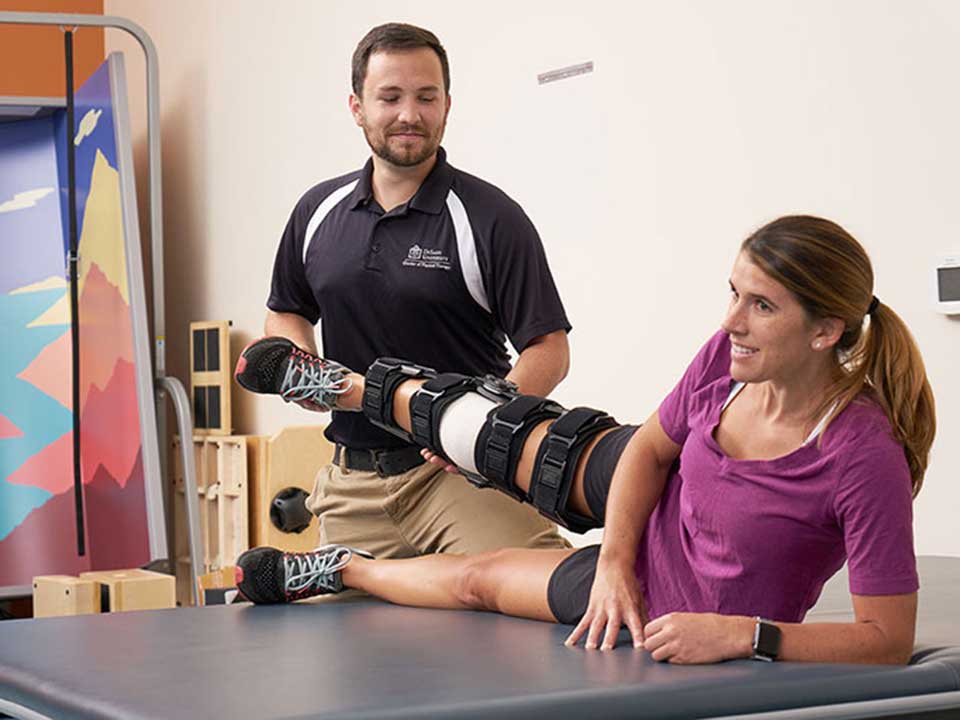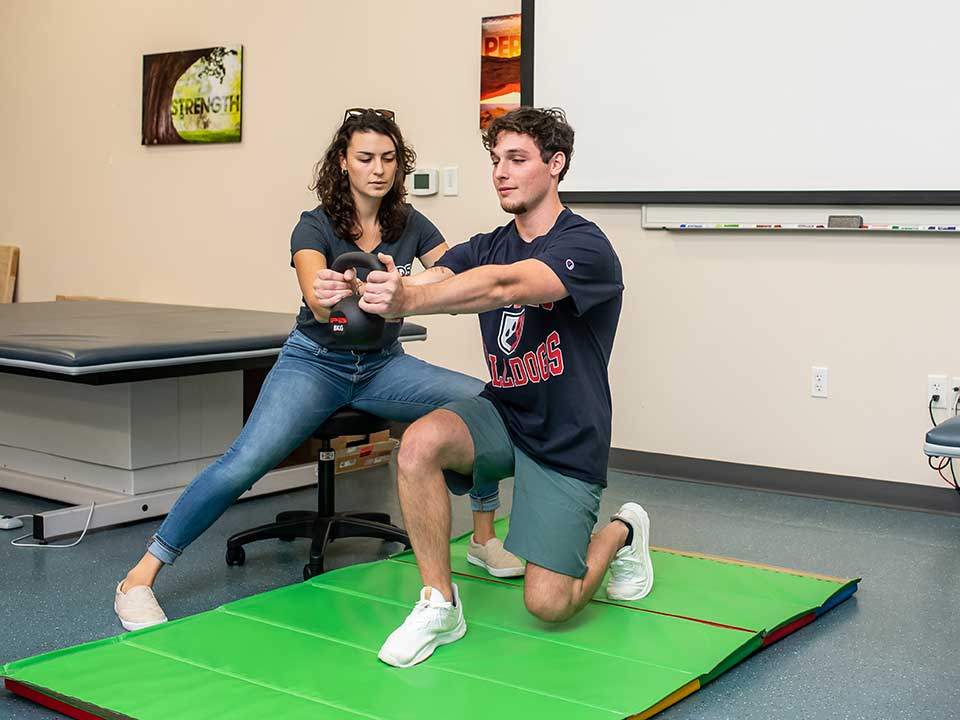College of Healthcare Professions
Master of Science in Physician Assistant Studies (MSPAS)
Today, the Physician Assistant (PA) career outlook is bright. To start your PA career off right, where you study and earn your master's degree matters. At DeSales, you’ll learn in world class facilities from dedicated faculty and have a variety of hands-on, clinical experiences.
Program Details
- Official Degree Name
- Master of Science in Physician Assistant Studies
- Format
-
In Class-Day
- Credit Hours
- 99
- Program Start
- Fall Semester
- Application Deadline
- December 1
- Average Time to Degree
- 24 Months
Why Get Your MSPAS Degree at DeSales University?
As a DeSales student in the Master of Science in Physician Assistant Studies program, you will join a cohort of equally ambitious and caring future providers. This full-time, 24-month program includes challenging coursework led by expert clinicians. You will complete nine, five-week rotations in your clinical year. This is also part of the 5-year Medical Studies to PA Accelerated program at DeSales.
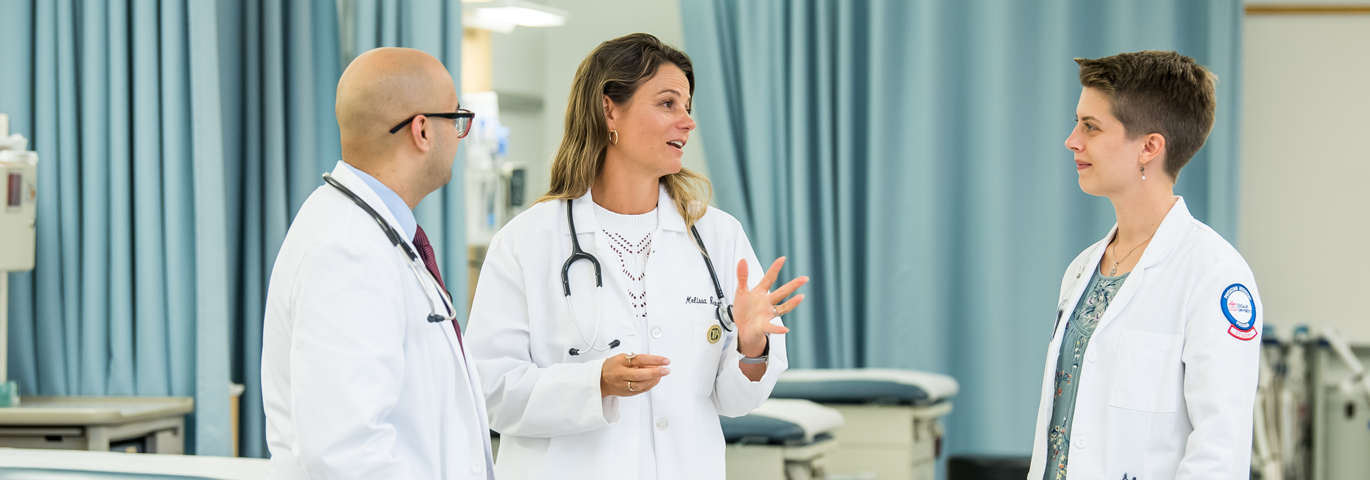
Program Highlights
Professional Development Opportunities
- As you earn your Master of Science in Physician Assistant Studies, you’ll have opportunities for hands-on learning. First Year Clinical Experiences start early in the first (didactic) year, giving you broad clinical experience. You will also gain experience at the DeSales Free Clinic, a student-run clinic located in the Allentown Rescue Mission, where MSPAS students provide culturally competent, cost-effective care. Our team of dedicated faculty allows for clinical rotations to be arranged for students. Experienced local preceptors allow you to complete your nine five-week rotations in your clinical year, all within commuting distance to the University. Consistent with ARC-PA accreditation standard A3.03, students "must not be required to provide or solicit clinical sites or preceptors."
Value and Return on Investment
- The PA profession is one of the fastest growing healthcare careers nationwide and was recently ranked as a top five healthcare job by U.S. News & World Report. The DeSales MSPAS will prepare you to pass the PANCE (national certifying exam) and chart a successful PA career path. The DeSales PA program excels at PANCE preparation, with a near-perfect first-time pass rate since the program began.
Proven Outcomes
- Learn from an accredited program: The Accreditation Review Commission on Education for the Physician Assistant, Inc. (ARC-PA) has granted Accreditation-Continued status to the DeSales University Physician Assistant Program sponsored by DeSales University. Accreditation-Continued is an accreditation status granted when a currently accredited program is in compliance with the ARC-PA Standards. Accreditation remains in effect until the program closes or withdraws from the accreditation process or until accreditation is withdrawn for failure to comply with the Standards. The approximate date for the next validation review of the program by the ARC-PA will be June 2027. The review date is contingent upon continued compliance with the Accreditation Standards and ARC-PA policy. The program’s accreditation history can be viewed on the ARC-PA website. Our graduates of the MSPAS program have a near perfect first-time PANCE rate since the program inception in 1997. DeSales MSPAS students have won six National Medical Challenge Bowls, 13 Pennsylvania Medical Challenge Bowls and three Regional Challenge Bowls.
What Will You Study?
All MSPAS students follow a 24-month curriculum that includes classroom instruction and experiential learning. Nine five-week rotations are required in your clinical year.
The MSPAS curriculum integrates clinical medicine, pathophysiology, and pharmacology. Learn to be a provider who values gentleness, wisdom, humility, hospitality, and gratitude.
Preview the full MSPAS curriculum.
Courses you will study include:
- Clinical Anatomy & Physiology
- Preventive Medicine & Health Promotion
- Ethics of Healthcare
- Clinical Skills Development
- Diagnostic Methods
- Clinical Rotations
MSPAS
Meet the Faculty
Outcomes, Technical Standards, Competencies, & Policies
The DeSales University MSPAS program outcomes include stellar first-time PANCE pass rates since the inception of the program.
Students gain strong fundamental knowledge of medicine along with varied experience, which prepare them for their roles as physician assistants.
The program is consistent with the Christian humanistic philosophy of the University. Graduates of the program will function as members of the health care team and as patient advocates.
- Program goals & success of goal data.
- Review our technical standards.
- Program required competencies.
- Program policies of interest to prospective students.
- Student attrition information.
Use the Scholars Network for employment after graduation and receive up to $65,000 in loan repayments.

Admission Requirements
- Verified application in CASPA no later than December 1. We do not require a supplemental application.
- Bachelor’s degree (or higher) from a regionally accredited institution, with a minimum overall cumulative GPA of 3.0 and a minimum science cumulative GPA of 3.0 (on 4.0 scale).
- 3-5 letters of recommendation.
- Physician Assistant College Admissions Test (PA-CAT) or Graduate Record Examination (GRE).
- A minimum of 500 hours of direct patient care experience in the U.S. (paid, volunteer, or shadowing).

Prerequisites
All prerequisite coursework must be completed before matriculation into the program. You may submit your application while completing prerequisite courses; however, only two outstanding courses can be completed after the deadline. Three courses must have been taken within five years of applying. All prerequisite coursework must be completed before matriculation into the program. You may submit your application while completing prerequisite courses; however, only two outstanding courses can be completed after the deadline. Our ten prerequisite courses must be a minimum of 3 credits each. Courses include English Composition I*, English Composition II*, General or Introduction to Psychology, Statistics, General Biology, General (Inorganic) Chemistry, Organic Chemistry, Microbiology, Human Anatomy & Physiology I and II, or one semester of Human Anatomy and one semester of Human Physiology. *Writing-intensive courses will be considered to satisfy the requirement if English Composition was not required for your curriculum. AP courses will also satisfy the requirement.
Three courses must have been taken within five years of applying: Microbiology, Human Anatomy and Physiology I and II. Exceptions may be made if you have been active in the medical field since taking the courses or graduating.
Program Support
program rankings
#26 Best Physician Assistant Programs
- U.S. News & World Report
#46 Best Value Colleges in Pennsylvania
- Niche
Program FAQs
December 1. To receive full consideration into the MSPAS for the next academic year, your CASPA application must be verified by CASPA no later than December 1.
Our events calendar houses all our academic calendars and the MSPAS clinical calendar. Simply use the Academic Calendar and Semester filters to see important upcoming dates.
The Healthcare Simulation Center is a state-of-the-art training facility where students gain hands-on experience with life-like manikins, standardized patients, and advanced medical equipment. It’s designed to help you build clinical skills and confidence before entering real healthcare settings.
The Accreditation Review Commission on Education for the Physician Assistant, Inc. (ARC-PA) has granted Accreditation-Continued status to the DeSales University Physician Assistant Program sponsored by DeSales University. Accreditation-Continued is an accreditation status granted when a currently accredited program is in compliance with the ARC-PA Standards.
Accreditation remains in effect until the program closes or withdraws from the accreditation process or until accreditation is withdrawn for failure to comply with the Standards. The approximate date for the next validation review of the program by the ARC-PA will be June 2027. The review date is contingent upon continued compliance with the Accreditation Standards and ARC-PA policy.
The program's accreditation history can be viewed on the ARC-PA website at http://www.arc-pa.org/accreditation-history-desales-university/.
24 months. The Physician Assistant program at DeSales University is a full-time academic program. Advanced placement is not possible. There is no credit awarded for experiential learning. The didactic courses are completed in sequence as listed in the curriculum.
Admission into our MSPAS program is highly competitive. We conduct a completely holistic review of all applications. We strive to select a diverse student body who demonstrates maturity, professionalism, academic potential, knowledge of the healthcare industry and the PA profession, and service, particularly with vulnerable or traditionally underserved populations.
We encourage applicants from all socioeconomic, racial/ethnic, and religious backgrounds to apply. DeSales is proud to participate in the Yellow Ribbon Program and gives special consideration to applicants who have served or are currently serving in the U.S. military.
While the program prefers a higher GPA, higher direct patient care hours, higher standardized test scores, as well as higher service hours, we conduct a completely holistic review of each application meeting minimum admission requirements. All components are considered including courses taken; GPAs, including trajectories; personal statement; the strength of the letters of recommendation; standardized test scores; and the breadth and depth of experiences.
Evaluation methods include:
- Potentially qualified applicants will be granted a personal interview by invitation only.
- Applicants will be evaluated on:
- Academic credentials
- Accountability
- Communication Skills
- Preparedness
- Professionalism
- Respectfulness
- Self-Confidence
- Understanding the role of the PA/Healthcare
- Experience with vulnerable or traditionally under-served populations
- Military Applicants
- As a proud Yellow Ribbon Program participant, special consideration is given to applicants who have served or are serving in the U.S. military.
- DeSales University Students and Alumni
- DeSales University students and alumni will be granted an interview upon meeting minimum requirements.
- Two seats are reserved for DeSales University students and alumni each incoming class.
- The Physician Assistant Program at DeSales University is a full-time academic program. Advanced placement is not possible. There is no credit awarded for experiential learning. The didactic courses are completed in sequence as listed in the curriculum.
The DeSales MSPAS program offers clinical rotations in the following fields of medicine:
- Emergency Medicine
- Family Medicine I and II
- Internal Medicine
- Women's Health
- Pediatrics
- Psychiatry
- Surgery
- Elective
Applicants with a degree or coursework outside of the U.S. should review the CASPA requirements for evaluated transcripts.
Applicants from a country where English is not the primary language must submit TOEFL scores with a minimum overall score of 90.
The DeSales PA program excels at PANCE preparation, with a near-perfect first-time pass rate since the program began.
PANCE is the only exam given to graduating physician assistants and it must be passed in order to be eligible for licensure in all 50 states.
The DeSales MSPAS is accredited by the Accreditation Review Commission on Education for the Physician Assistant (ARC-PA). Therefore, when you graduate you are eligible to sit for the PANCE (Physician Assistant National Certification Examination).
- Five Year First Time Taker Summary Report (PDF)* - typically updated by the end of each March
- DeSales All-Time PANCE Results (PDF)* - typically updated by the end of each March
* DeSales University is committed to maintaining an accessible website. PDFs can be a known issue for screen readers. If you are using a screen reader and are having trouble with the above files, please contact the DeSales University Office of Student Accessibility at 610-281-1100, ext. 1239.
DeSales University graduates are highly sought after. Based on graduate survey results, 100% of our graduates are employed as physician assistants within six months of graduating. Additionally, approximately 67% of students have already obtained jobs or fellowships by graduation.
We gladly help place our graduates in jobs and maintain a DeSales-only job list.
Yes! The Human Anatomy Lab (cadaver lab) is an important component and unique advantage to our program. MSPAS students have access to first dissection, with hands-on experience that creates an active learning environment. Students are provided with a real understanding of the human body, including the effects of diseases beyond a textbook description or digital/virtual anatomy platforms.
Interviews and acceptances generally begin in the summer and generally continue until early in the year. All final decisions are made no later than February of the year students would matriculate into the program.
Students are taught to provide highly effective care to a diverse patient population. Our student body consists of those with differing religious and spiritual beliefs, experiences, and values, enabling us to engage in rich dialogue in our medical ethics discussions. While students are not directly involved with certain types of procedures, including abortion, they are taught how to best care for all patients, in any situation.
While we do not offer scholarships at this time, we encourage you to compare the total expense of our program during your evaluation. Our tuition is already highly competitive, and our professional fees include, but are not limited to, all of your textbooks/medical resources, lab equipment and fees, technology and education fees.
In addition, our students save time and money without having to absorb the significant cost of travel to clinical sites, as all of our clinical locations are less than an hour away (with the vast majority only approximately 20 miles away). No significant travel expenses (flights, hotels, gas, etc.), no worrying about changing your lease in your second year – so students can focus on their priorities.
Yes, we're working with the Scholars Network to partner with several large healthcare providers in the area. Currently, our partners are offering up to $65,000 loan repayment for a 3-year commitment for our Physician Assistant students.
Limited graduate housing is available on-campus. Additional information regarding both on-campus and off-campus options is provided to students upon acceptance into the program.
No, if you have already taken the course, you do not need to repeat the course with the lab component. But, if you are enrolling in a science course, it is highly recommended that you take one with a lab. Your application and performance in the course will be strengthened by taking an accompanying laboratory experience.
Yes, the GRE or the PA-CAT are required. MCAT scores will be accepted in place of GRE scores, provided the applicant scored a minimum of 500 on the exam. No other standardized tests will be accepted.
When submitting your GRE scores, please use the program code 0540.
The most useful health care experiences relate to direct patient contact (i.e., EMT, Certified Nursing Assistant, Medical Assistant, Patient Care Technician, Medical Scribe, Surgical Technician, Dietician, Athletic Trainer, Physical Therapist Assistant, Mental Health Worker, etc.). Usually, the more diverse the experience, the better for incoming students. Shadowing of clinically active physician assistants is encouraged in order to gain an understanding of the role.
Applicants must complete the minimum requirement of 500 patient care hours prior to matriculation into the program (late August every year). Competitive applicants have already met the minimum requirement upon application submission, however you may submit your application with 250 hours completed.
You may submit your application while completing prerequisite courses, however only two outstanding prerequisite courses can be carried over into the year of matriculation into the program.
After your application has been verified by CASPA and DeSales has confirmed receipt with you via email, any updates to your application may be sent directly to mspas@desales.edu.
updated April 2025
1. Maintain PANCE first-time taker pass rates higher than the national average.
- Measure: PANCE first-time taker cohort pass rate
- Benchmark: Above national average
- Success of Goal:
| Cohort | DeSales Cohort First-Time Taker Pass Rate | National First-Time Taker Pass Rate |
| 2020 | 99% | 95% |
| 2021 | 99% | 93% |
| 2022 | 95% | 92% |
| 2023 | 97% | 92% |
| 2024 | 100% | 93% |
2. Prepare graduates to obtain employment within the first six months following program completion.
The DeSales PA Program utilizes various modalities in the curriculum to prepare graduates for employment and assist with job placement. Students attend one-on-one advising sessions with faculty at least three times annually during both their didactic and clinical years. Advising sessions are used to monitor academic and professional progress in the program, as well as to provide mentoring and professional development.
- Measure: Curricular Offerings
- Benchmark: Provide more than 3 varied curricular offerings annually
- Success of Goal
| 2020 | 2021 | 2022 | 2023 | 2024 | |
| Employment Lecture | Yes | Yes | Yes | Yes | Yes |
| Resume Assignment | Yes | Yes | Yes | Yes | Yes |
| Mock Interview | No | Yes | Yes | Yes | Yes |
| Recruiting Visit #1 | Yes | Yes | Yes | Yes | Yes |
| Recruiting Visit #2 | Yes | Yes | Yes | Yes | Yes |
| Credentialing/Licensure Lecture | Yes | Yes | Yes | Yes | Yes |
| Career Services Availability | Yes | Yes | Yes | Yes | Yes |
| Academic/Professional Advising Every Semester | Yes | Yes | Yes | Yes | Yes |
- Measure: Job Placement
- Benchmark: 90% of graduates placed in six months
- Success of Goal*:
| Cohort | Job Placement Rate |
| 2020 | 93% |
| 2021 | 100% |
| 2022 | 100% |
| 2023 | 96% |
| 2024 | 94% |
*Results based on Graduate Survey (Response rate varies from 32% to 74%)
3. Foster and maintain collaborative connections between the students and faculty.
The DeSales PA Program utilizes various modalities to foster and maintain collaborative connections. Students attend one-on-one advising sessions with faculty at least three times annually during both their didactic and clinical years. In addition, students are encouraged to schedule additional one-on-one sessions with faculty as deemed necessary. Students connect with a clinical faculty member on every rotation for a mid-rotation site visit with either an in-person or virtual visit.
- Measure: Student to Faculty Ratio
- Benchmark: Better than National PAEA Average
- Success of Goal:
| DeSales Student: Faculty Ratio | National PAEA Student: Faculty Ratio | Source |
| 11:1 | 14.4:1 | PAEA Program Report 34 |
| 11:1 | 13.3:1 | PAEA Program Report 35 |
| 11:1 | 12.8:1 | PAEA Program Report 36 |
- Measure:
- Faculty Evaluation of Curriculum (Collaborative Connections between Faculty and Students)
- End of Didactic Evaluation of Curriculum (Collaborative Connections between Faculty and Students)
- Exit Survey Evaluation of Curriculum (Collaborative Connections between Faculty and Students)
- Graduate Survey Evaluation of Curriculum (Collaborative Connections between Faculty and Students)
- Staff Survey Evaluation of Curriculum (Collaborative Connections between Faculty and Students)
- Benchmark: Better than program benchmark of 3.5 out of 5.0 on all assessments
- Success of Goal:
| Cohort | Faculty Survey | End of Didactic Survey | Exit Survey | Graduate Survey | Staff Survey |
| 2021 | 4.86 | 4.36 | 4.42 | 4.50 | N/A |
| 2022 | 4.76 | 4.72 | 4.63 | 4.52 | N/A |
| 2023 | 5.00 | 4.49 | 4.63 | 4.64 | N/A |
| 2024 | 4.82 | 4.52 | 4.63 | 4.31 | 4.67 |
| 2025 | 4.79 | 4.73 | Pending | Pending | 5.00 |
4. Provide early professional experiences to complement classroom teaching.
- Measure: Percentage of students that participate in early professional experiences in the didactic year.
- Benchmark: 100%
- Success of Goal
| Cohort | % of Participating Students |
| 2021 | 100% |
| 2022 | 100% |
| 2023 | 100% |
| 2024 | 100% |
| 2025 | 100% |
- Measure:
- Exit Survey (Value of First Year Professional Experiences)
- Grad Survey (Value of First Year Professional Experiences)
- Benchmark: Better than program benchmark of 3.5 out of 5.0
- Success of Goal
| Cohort | Exit Survey | Grad Survey |
| 2020 | 4.36 | 4.64 |
| 2021 | 4.77 | 4.52 |
| 2022 | 4.60 | 4.18 |
| 2023 | 4.76 | 4.57 |
| 2024 | 4.52 | 4.58 |
- Measure:
- Faculty Evaluation of Curriculum (Student Preparation with Simulation)
- End of Didactic Evaluation of Curriculum (Student Preparation with Simulation)
- Exit Survey Evaluation of Curriculum (Student Preparation with Simulation)
- Graduate Survey Evaluation of Curriculum (Student Preparation with Simulation)
- Benchmark: Better than program benchmark of 3.5 out of 5.0 on both assessments
- Success of Goal:
| Cohort | Faculty Survey | End of Didactic Survey | Exit Survey | Graduate Survey |
| 2021 | 4.77 | 4.47 | 4.50 | 4.55 |
| 2022 | 5.00 | 4.56 | 4.77 | 4.68 |
| 2023 | 4.91 | 4.60 | 4.73 | 4.35 |
| 2024 | 5.00 | 4.47 | 4.56 | 4.47 |
| 2025 | 5.00 | 4.70 | Pending | Pending |
5. Develop critical reasoning skills.
- Measure: Percentage of students that are exposed to Problem-Based Learning (PBL) and clinical reasoning in the didactic year.
- Benchmark: 100&
- Success of Goal:
| Cohort | $ of Students Exposed to PBL and Clinical Reasoning in Didactic Year |
| 2021 | 100% |
| 2022 | 100% |
| 2023 | 100% |
| 2024 | 100% |
| 2025 | 100% |
- Measure:
- Faculty Evaluation of Curriculum (Problem Solving Skills/Critical Thinking);
- End of Didactic Evaluation of Curriculum (Problem Solving Skills/Critical Thinking)
- Exit Survey Evaluation of Curriculum (Problem Solving Skills/Critical Thinking)
- Graduate Survey Evaluation of Curriculum (Problem Solving Skills/Critical Thinking)
- Benchmark: Better than program benchmark of 3.5 out of 5.0 on all assessments
- Success of Goal:
| Cohort | Faculty Survey | End of Didactic Survey | Exit Survey | Graduate Survey |
| 2021 | 4.86 | 4.51 | 4.63 | 4.55 |
| 2022 | 4.64 | 4.67 | 4.78 | 4.61 |
| 2023 | 5.00 | 4.49 | 4.79 | 4.61 |
| 2024 | 5.00 | 4.57 | 4.78 | 4.56 |
| 2025 | 4.86 | 4.82 | Pending | Pending |
6. Provide education on and/or experiences with diverse and vulnerable populations.
The DeSales PA Program includes curricular elements that expose students to diverse and vulnerable populations. All students care for patients at the DeSales Free Clinic at the Allentown Rescue Mission multiple times during their education and may have experiences with other varied vulnerable populations.
- Measure: All students complete at least three experiences with vulnerable populations.
- Benchmark: 100%
- Success of Goal:
| Cohort | % of students with experience with vulnerable populations |
| 2020 | 100% |
| 2021 | 100% |
| 2022 | 100% |
| 2023 | 100% |
| 2024 | 100% |
- Measure:
- Faculty Evaluation of Curriculum (Education/Experience with Diverse and Vulnerable Populations)
- End of Didactic Evaluation of Curriculum (Education/Experience with Diverse and Vulnerable Populations)
- Exit Survey (Education/Experiences with Diverse and Vulnerable Populations)
- Graduate Survey (Education/Experience with Diverse and Vulnerable Populations)
- Staff Survey (Education/Experience with Diverse and Vulnerable Populations)
- Benchmark: Better than program benchmark of 3.5 out of 5.0 on all three assessment
- Success of Goal:
| Cohort | Faculty Survey | End of Didactic Survey | Exit Survey | Graduate Survey | Staff Survey |
| 2021 | 4.57 | 4.28 | 4.48 | 4.54 | N/A |
| 2022 | 4.64 | 4.58 | 4.61 | 4.52 | N/A |
| 2023 | 5.00 | 4.32 | 4.58 | 4.41 | N/A |
| 2024 | 4.64 | 4.37 | 4.56 | 4.36 | 4.33 |
| 2025 | 4.71 | 4.66 | Pending | Pending | 4.67 |
7. Emphasize a focus on interprofessional education and practice.
The DeSales PA Program participates in various interprofessional educational activities including work with students from physical therapy, occupational therapy, speech and language pathology, nursing, and registered dietetics programs, as well as medical students.
- Measure: All students complete at least five interprofessional experiences (IPE).
- Benchmark: 100%
- Success of Goal:
| Cohort | % of students with at least 5 IPE |
| 2021 | 100% |
| 2022 | 100% |
| 2023 | 100% |
| 2024 | 100% |
| 2025 | 100% |
- Measure:
- Faculty Evaluation of Curriculum (Interprofessional Team Care)
- End of Didactic Evaluation of Curriculum (Interprofessional Team Care)
- Exit Survey Evaluation of Curriculum (Interprofessional Team Care)
- Graduate Survey Evaluation of Curriculum (Interprofessional Team Care)
- Benchmark: Better than program benchmark of 3.5 out of 5.0 on both assessments
- Success of Goal
| Cohort | Faculty Survey | End of Didactic Survey | Exit Survey | Graduate Survey |
| 2021 | 4.64 | 4.42 | 4.47 | 4.28 |
| 2022 | 4.73 | 4.69 | 4.61 | 4.57 |
| 2023 | 4.73 | 4.49 | 4.68 | 4.57 |
| 2024 | 4.73 | 4.44 | 4.76 | 4.58 |
| 2025 | 4.79 | 4.73 | Pending | Pending |
8. Support the varied backgrounds of all program constituents including students, staff, and faculty.
The DeSales PA Program has an active Mission Advancement Committee which aids the program in developing goals, tracking progress, and providing curricular and extra-curricular activities for students, staff, and faculty.
- Measure:
- Faculty Survey Achievement of Goals
- End of Didactic Survey Achievement of Goals
- Exit Survey Achievement of Goals
- Graduate Survey Achievement of Goals
- Staff Survey
- Benchmark: Better than Program benchmark of 3.5 out of 5.0 on both assessments
- Success of Goal:
| Cohort | Faculty Survey | End of Didactic Survey | Exit Survey | Grad Survey | Staff Survey |
| 2021 | 4.57 | 4.38 | 4.54 | 4.58 | N/A |
| 2022 | 4.64 | 4.73 | 4.66 | 4.59 | N/A |
| 2023 | 4.90 | 4.53 | 4.68 | 4.55 | N/A |
| 2024 | 4.73 | 4.54 | 4.66 | 4.50 | 4.33 |
| 2025 | 4.57 | 4.72 | Pending | Pending | 4.75 |
- Measure:
- Faculty Evaluation of Curriculum (Institutional Support for the Varied Backgrounds of All Program Constituents)
- Staff Survey (Institutional Support for the Varied Backgrounds of All Program Constituents)
- Benchmark: Better than program benchmark of 3.5 out of 5.0 on all assessments
- Success of Goal:
| Cohort | Faculty Survey | Staff Survey |
| 2021 | 4.36 | N/A |
| 2022 | 4.64 | N/A |
| 2023 | 4.90 | N/A |
| 2024 | 4.10 | 3.67 |
| 2025 | 4.00 | 5.00 |
Recent News
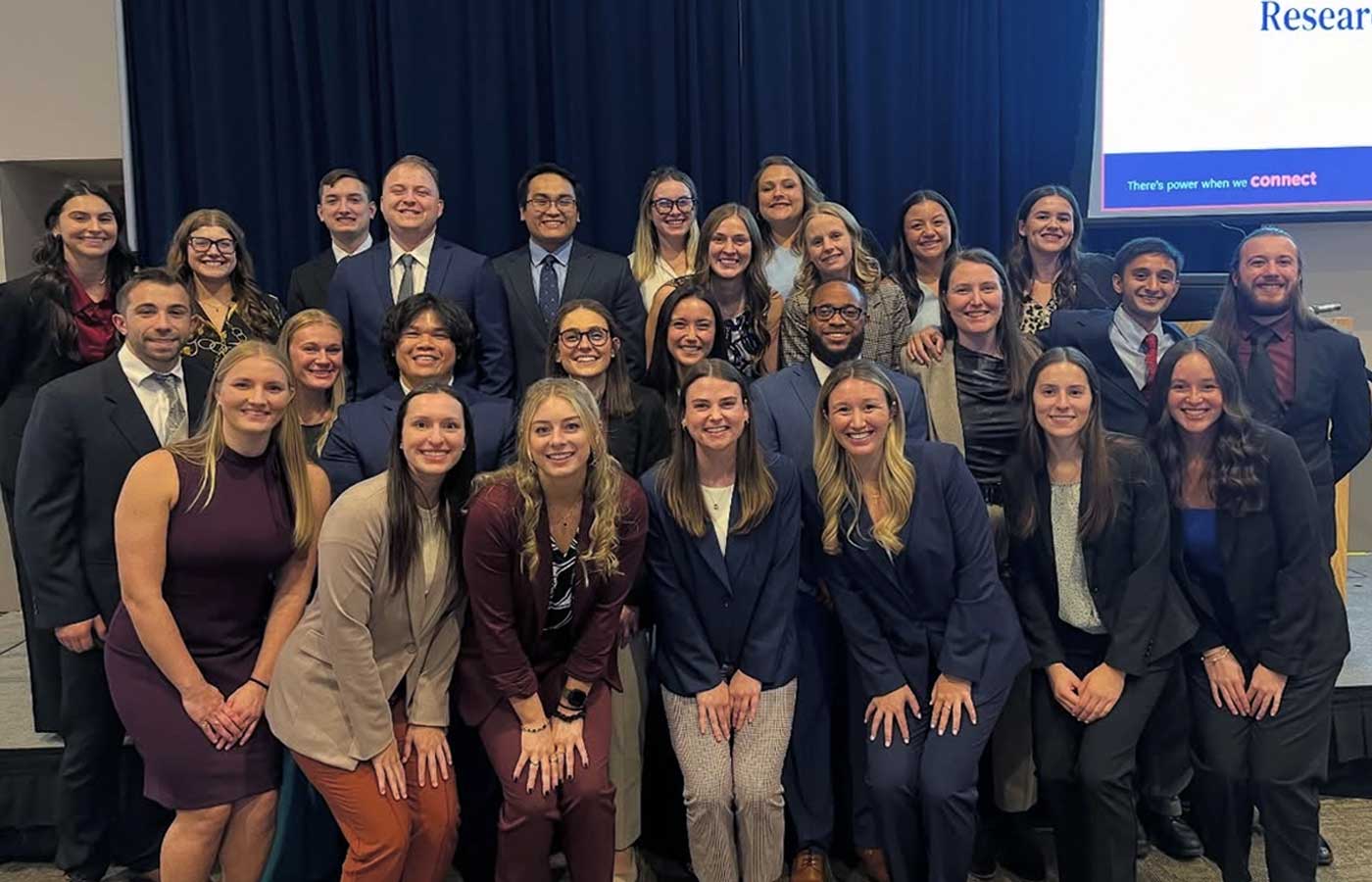
DPT Students Showcase Research at Annual Symposium
Doctor of Physical Therapy students at DeSales University presented original research projects during the 2025 DPT Research Symposium, highlighting innovation in patient care, rehabilitation, and healthcare education. More than 200 guests attended the event celebrating clinical research and collaboration. The DeSales DPT program prepares future physical therapists to combine science, compassion, and Salesian values in practice.
Read More
5 Signs You May Be Meant to Be a Nurse
Discover five signs you’re meant to be a nurse and how DeSales University’s nursing programs prepare you to lead with compassion and skill.
Read MoreMaster of Science in Physician Assistant
Contact
-
610-282-1100 x1415 -
mspas@desales.edu -
Gambet Center



